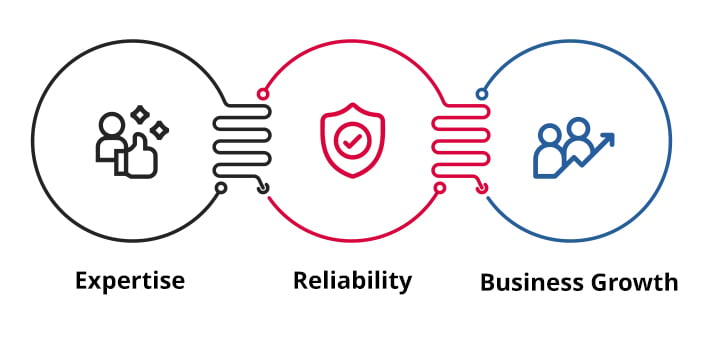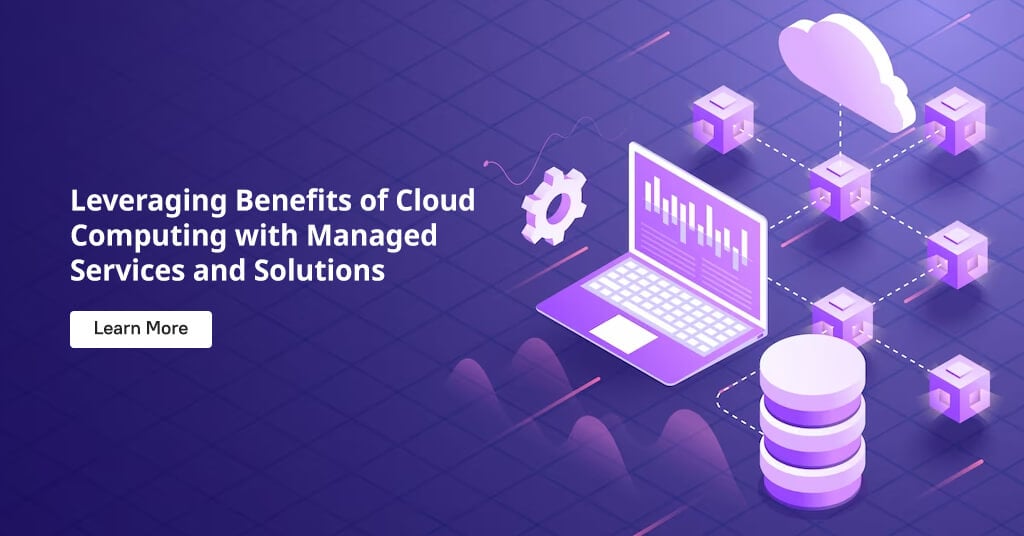Research by Gartner says that while most people today think of the cloud as a technology platform, this perspective will shift by 2027. At that time, cloud computing will be seen as the key driver of business innovation apart from being a technological approach for delivering applications.
What should businesses be planning to ensure they maximize the benefits of cloud managed services? According to a research report the focus should be on delivering maximum business value in minimum time.
What Comprises Cloud Managed Services and Why Should They Matter?
Cloud managed services involve businesses outsourcing the oversight and administration of their cloud infrastructure. This involves monitoring of the cloud infrastructure, enhancing performance, ensuring security and data backups, carrying out maintenance tasks, and enabling scalability when required.
Cloud managed services can help free-up key resources within a business, allowing them to focus on other critical objectives, such as business building activities. Some of the key components of cloud managed services include:
#1. Infrastructure Management: This includes management of underlying cloud infrastructure, including servers, storage, networking, etc. The service provider ensures the infrastructure is well configured, optimized, and maintained to meet the business’s needs.
#2. Monitoring and Support: Monitoring of cloud infrastructure and proactively identifying and resolving problems affecting the applications is part of support solutions provided by outsourcing agencies. The eventual aim of consistent monitoring is to optimize cloud performance.
#3. Backup and Disaster Recovery: Managed service providers establish backup and disaster recovery strategies to protect data from loss or corruption. They perform regular backups, create redundancies, and develop recovery plans to ensure business continuity in the event of a disaster.
#4. Scalability and Performance Optimization: Cloud providers aid businesses in scaling resources for fluctuating demands, optimizing infrastructure and applications for peak performance and cost-efficiency ensuring seamless operations.
#5. Application Management: This involves managing and maintaining the business applications running on the cloud infrastructure. It includes software installation, updates, patching, and troubleshooting to ensure the applications function properly.
#6. Security and Compliance: Cloud managed service providers work with proven systems and infrastructure. Their systems and processes are also compliant with legal and regulatory requirements. This enables businesses to focus on their operations without worrying about data security.
Importance of Cloud Managed Services

Cloud managed services encompass a variety of cloud-based solutions, such as architecture, design, interconnectivity, and more.
Cloud managed services free up businesses from technological issues, enabling them to focus on the core business and the critical task of growth. From prioritizing technical, compliance, and security matters, to ensuring better resource allocation, to helping risk mitigation and enhancing data integrity, outsourced assistance enables business to shift their focus to business growth without negatively impacting existing deliverables.
However, merely implementing cloud managed services may not suffice to enhance business productivity and profitability. Putting into place a strategy can help businesses leverage benefits of cloud computing while minimizing risks. This also helps them build and maintain a competitive edge in the digital landscape.
Benefits of Cloud Managed Services
Strategic Support | Cloud managed services, provided by experts, assist businesses strategically from needs assessment through implementation, post-deployment support, and troubleshooting. This comprehensive support helps businesses optimize their cloud resources, boosting productivity and profitability in a dynamic landscape. |
Cost Efficiency | Intelligent resource allocation and management, leveraging cost-effective services, and implementing efficient utilization strategies help businesses reduce cloud costs with the help of managed services. Optimizing cloud managed services allows businesses to eliminate unnecessary costs while aligning the cloud infrastructure with their requirements. |
Competitive Edge | Efficient utilization or optimization of cloud managed services helps businesses maintain configurations, improve performance, drive productivity, and improve end-user experience at the content delivery stage. This helps businesses gain a competitive edge. |
Scalability and Flexibility | Optimization of cloud managed services enables businesses to scale their cloud resources without loss of efficiency. This is done through efficient auto-scaling mechanisms, load balancing, and elasticity features, all of which help businesses adjust their resources to match changing or dynamic demands. Building scalability also helps businesses to become more responsive and adaptable towards emerging technologies. |
Regular Security Assessments | Optimized cloud managed services allow timely implementation of security measures, including adherence to compliance standards. Businesses ensure risk mitigation through regular security assessments, encryption, monitored access to controls, and intrusion detection systems. This also ensures integrity of data and applications is maintained. |
Ensuring Business Continuity | Optimization of cloud managed services helps businesses maintain their cloud infrastructure at high availability and resilience levels. By implementing redundancy, fault tolerance, and disaster recovery mechanisms, businesses can minimize downtime and ensure business continuity, even in the face of unforeseen events or disasters. |
Types of Cloud-Managed Services
Some of the cloud managed services which businesses can access include:
#1. Infrastructure as a Service (IaaS) Management: IaaS management, as the name suggests, involves managing and maintaining infrastructure components, like storage and networks. Businesses can leverage this for their needs in provisioning, scaling, and security management.
#2. Platform as a Service (PaaS) Management: PaaS management helps with applications deployment, performance optimization, and ensuring platform infrastructure is maintained optimally.
#3. Hybrid Cloud Management: Integrating resources across multiple cloud platforms, assisting workload allocation, and ensuring optimal performance.
Apart from the specific kinds mentioned above, cloud managed services also include:
- Monitoring cloud performance to spot issues, conduct troubleshooting, and optimize overall performance for efficiency. Ensuring business continuity through data backup and recovery.
- Help cost optimization through effective resource allocation and management.
- Manage and maintain applications that are cloud-based, including software installation, troubleshooting, upgrading, and security updates.
Advantages of Cloud Managed Services
Cloud managed services offer businesses numerous benefits, including expert support, cost optimization, enhanced security, improved performance, and the ability to focus on core business activities. They provide businesses with the necessary technical expertise and infrastructure management capabilities to leverage the full potential of the cloud while reducing operational burdens and helping businesses address technological challenges.
Some cloud managed services that businesses can benefit from, include:
- Assistance with cloud migration and deployment
- Legacy application modernization, if required
- Cloud management and troubleshooting
- Application monitoring
- Infrastructure management
- Storage and database management
- Computing
- Ensuring network uptime and security
Unlocking Value: How Outsourced Expertise in Cloud Managed Services Drives Business Growth
Reduction in Operational Workload: Businesses can leverage the convenience of the managed service provider’s infrastructure and resources. This reduces the workload from in-house resources, leaving them free to focus on other high-value work such as business-building.
Access to Expertise: Cloud managed service providers have dedicated teams with expertise in various cloud technologies, security, and optimization. Businesses can leverage this specialized knowledge and experience in managing complex cloud infrastructures.
Cost Optimization: Cloud managed services can help businesses optimize costs associated with cloud infrastructure. Service providers can analyze usage patterns, identify unnecessary expenses, and suggest cost-saving measures. They also offer flexible pricing models, allowing businesses to pay for only the resources they require.
Improved Performance and Reliability: With dedicated monitoring and optimization, managed service providers can enhance the performance and reliability of cloud infrastructure and applications. They proactively identify bottlenecks, apply performance tuning, and ensure high availability, resulting in improved user experience and productivity.
Scalability and Flexibility: Cloud managed services enable businesses to scale their infrastructure rapidly in response to changing requirements. Service providers offer flexible resources and architectures that can accommodate growth or seasonal spikes without disrupting operations.
Ready to harness the full potential of cloud managed services? Connect with our expert team today and unlock a seamless, optimized cloud experience tailored to your business needs. Let’s propel your business into the future together! For any inquiries, feel free to email us at sales@analytix.com or give us a call at 781.503.9003.
